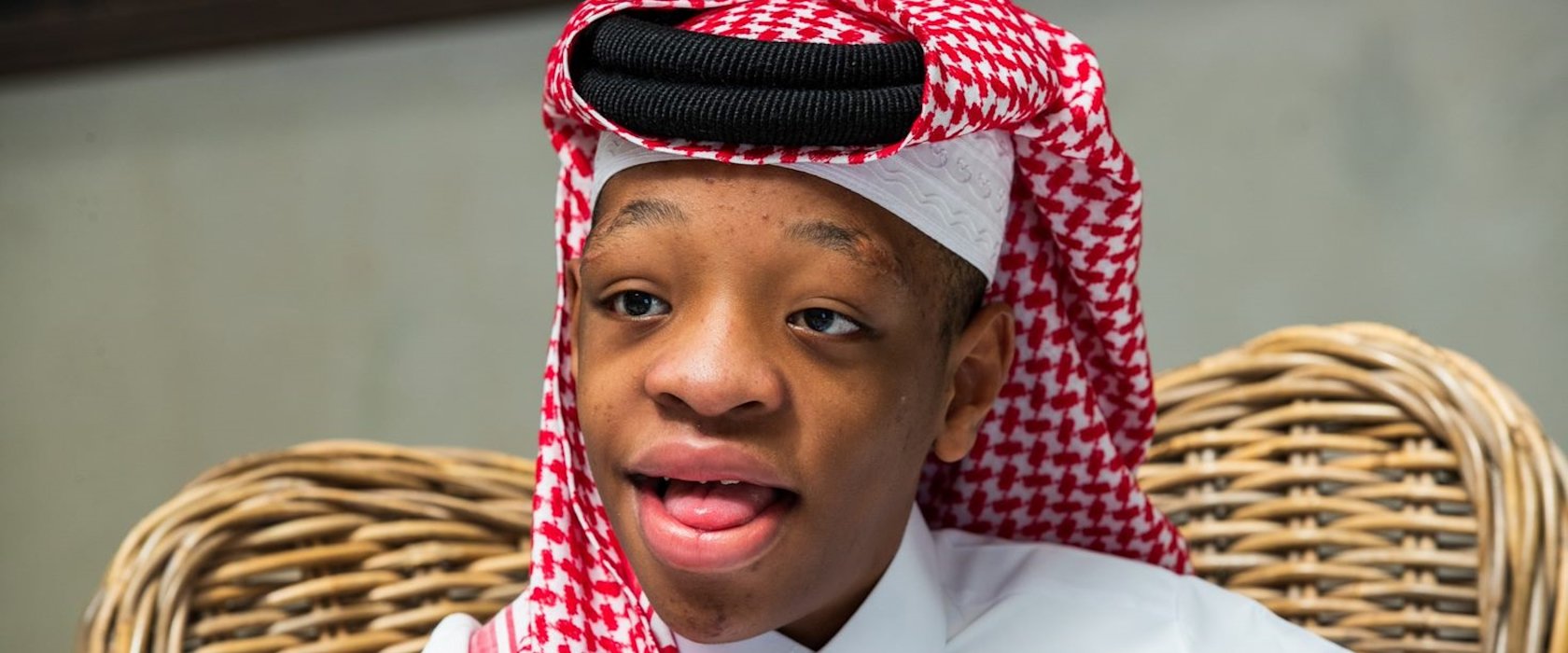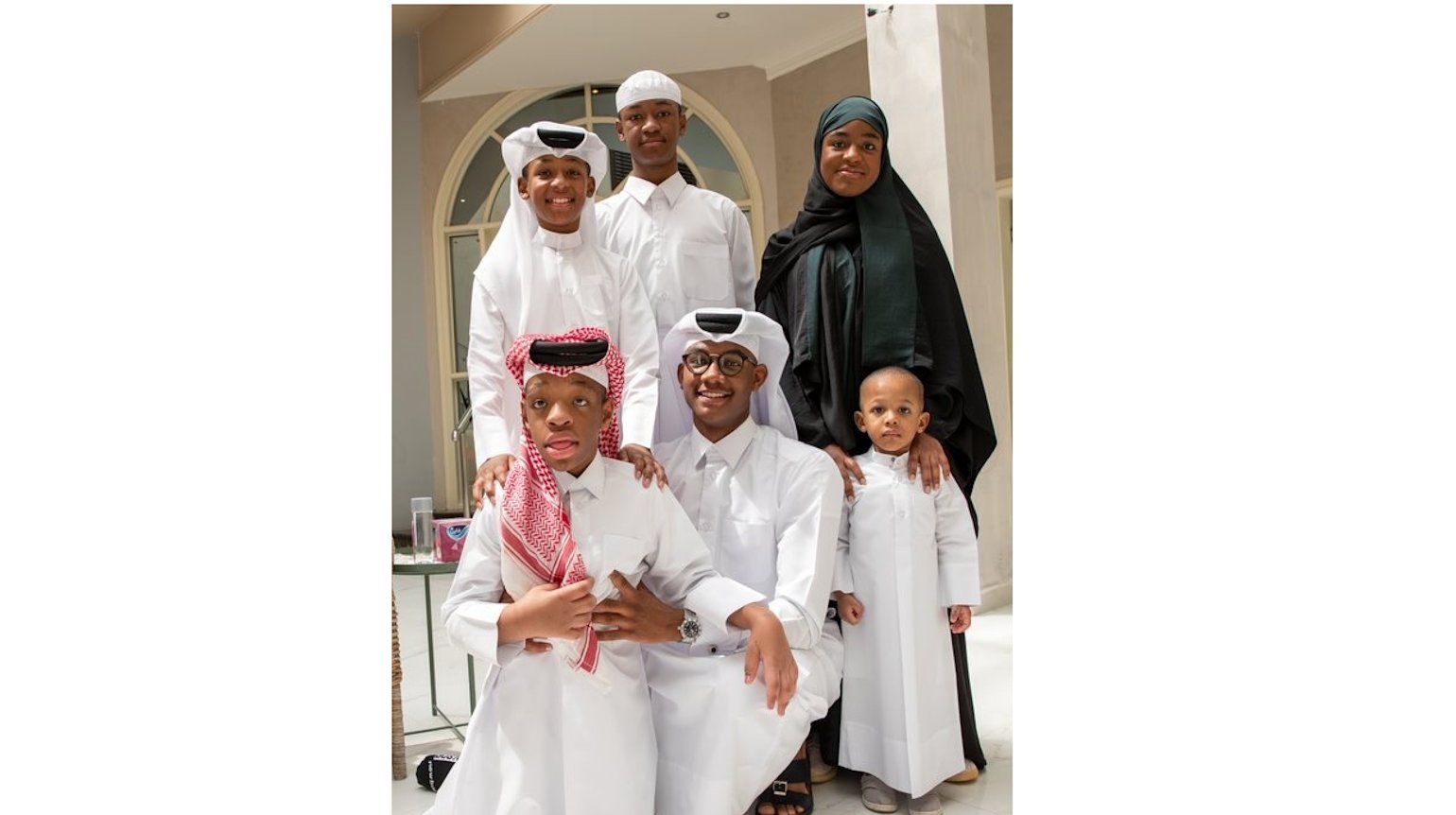Coronavirus (COVID-19) Updates
For the latest COVID-19 information and updates from Qatar Foundation, please visit our Statements page

Shama Al-Hamad, mother of a child with Coffin-Lowry Syndrome, says building memories with her son and living in the moment is what matters now
It’s seven in the morning, Ahmed wears his thobe and looks in the mirror while fixing his ghutra. He looks at himself in admiration. He asks his mother if she noticed how handsome he has become at the age of 13.
His mother smiles, and sadly remembers that her son is now 13 years old. This number brought forth her fears about what laid ahead for Ahmed. She recalled a conversation with her friend living outside of Qatar about a condition that both their sons suffered from.
“According to research, when our children reach the age of 15, they are more susceptible to muscular atrophy and spinal cord ischemia. This will paralyze them. They will suffer greatly, and leave us at a very young age,” her friend said.
I recalled what my friend said to me, that when our children, with Coffin-Lowry Syndrome, reach the age of 15, they may get paralyzed, they will suffer greatly, and leave us at a very young age
Shama Al-Hamad, the President of the Parents’ Association at Awsaj Academy – part of Qatar Foundation’s Pre-University Education – and a mother of six children, says that before the birth of Ahmed and his twin brother Faisal, she had never heard of a condition called the Coffin-Lowry Syndrome (CLS) – and that medical experts told her that, previously, no case of CLS had been recorded in Qatar.
After his birth, Ahmed developed many health issues which doctors were unable to diagnose. He was born suffering from asthma, hernia, breathing difficulties, and did not have the ability to breastfeed. “I always had a hospital bag ready for emergencies,” Al-Hamad says.

Ahmed’s mother wonders, what if something bad happened to her, who will take care of Ahmed
Medical experts told me that, previously, no case of the Coffin-Lowry Syndrome had been recorded in Qatar
“Due to an inflammation in his hernia, he had an operation, and after a year, he began to suffer from severe enlargement of a nasal polyp, and he developed asthma as he was taking seven types of medications. All these health issues were symptoms of a rare genetic disorder.”
Ahmed underwent several medical examinations and even had an analysis of his genes in a hospital abroad. During this process, all his limbs were photographed in a way that worried his mother. The concern on the doctors' faces predicted that her child's condition was indeed extremely rare.
“While I was waiting for the results, I was thinking how at the age of one, Ahmed’s twin, Faisal was growing and taking his first steps and learning to speak, while Ahmed was unable to crawl and move. I was wondered how did I carry these boys together in my womb while God chose a different fate for each,” Al-Hamad says.

Ahmed’s brothers say that he is a source of joy and strength for all of them
Three months later, she received the result of the diagnosis: Ahmed was suffering from Coffin-Lowry Syndrome, an extremely rare genetic disorder that causes several mental conditions, sometimes accompanied by developmental disorders, cardiac malformations, lateral kyphoscoliosis, and auditory and visual abnormalities.
“I thanked God that my son was finally diagnosed. I tried to understand what CLS is. And each time I discover new information, I would be startled and shocked.”
It is said in CLS early diagnosis gives family members the opportunity to learn how the disease progresses, and thereby allowing for better care of children with this condition. Given the rarity of this condition, Al-Hamad says that there is a need to develop a research laboratory in Qatar to study this disease and understand it better.

Ahmed crawls on his knees; he is unable to stand straight due to the possibility of falling on his head.

Due to his facial features being different from others, Ahmed has always been on the receiving end of strange looks from people in public places. This lack of integration in normal society, and as a commitment to her role at Awsaj Academy of being the President of the Parents’ Association, she has decided to use social media as a tool to raise awareness about those children.
She started a page on Instagram and Facebook called momlybys.qa where she offered counseling in cooperation with doctors and experts in special education. Besides this, she also provides workshops for mothers on how to deal with conditions such as stress, insomnia, hyperactivity, and high fever in children through alternative medicine, such as using the Aromatherapy to reduce the child’s exposure to chemicals.
“Ahmed motivated me to become an active member of the community and strive to make a difference. He also fostered feelings of love and unity among his family members. If Ahmed feels sad or sick, all his brothers stand by him. They love him immensely as he is a source of joy and strength for all of us,” Al-Hamad says.
Every morning, Al-Hamad checks on her son to make sure that he is fine, despite being prepared for any fate that God has destined for him. Suffocation is the common cause of death in children from CLS who become unable to walk and speak as they age and may not live long. At the same time, she wonders: “What if something bad happened to me and I left before my son, who will take care of him. He refuses to eat if I stay away from him.”

If Ahmed feels sad or becomes sick, all his brothers stand by him
“I often hold Ahmed’s hand and we walk on the beach – it’s his favorite place as he loves to see his footprints in the sand. I want him to enjoy it before any possibility of him being paralyzed.”
Often, Ahmed is unable to stand straight due to sudden episodes of convulsions and the possibility of falling on his head. So, he crawls on his knees, and only in certain situations can he stand.
“My son only walks on sand, which has the flexibility to help him keep his balance. I will never forget how he walked in Oxygen Park in Education City – he took so many steps. He’s able to walk on the beach also,” Al-Hamad explains.
Having fun together and creating memorable experiences is what matters now. What will come after it is in the hands of God.

Ahmed with his sister and brothers.
But now, with Ahmed showing signs of impaired mobility, Al-Hamad is starting to prepare for the possibility of him being paralyzed. “I often hold Ahmed’s hand and we walk together in the park or on the beach – it’s his favorite place as he loves to see his footprints in the sand. So, I want him to enjoy it as much as he can.”
Every day, Ahmed spends time with his twin brother – they eat together, play together, and enjoy Khaleeji music.
“This life is full of challenges, and the biggest challenge is not to let our fear of the future spoil our present moments. Having fun together and creating memorable experiences like dancing and laughing is what matters now. What will come after it is in the hands of God.”

